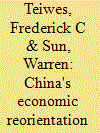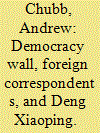|
|
|
Sort Order |
|
|
|
Items / Page
|
|
|
|
|
|
|
| Srl | Item |
| 1 |
ID:
122320


|
|
|
|
|
| Publication |
2013.
|
| Summary/Abstract |
Although the broad outlines of the conflicting views and interests concerning economic readjustment following the December 1978 Third Plenum are adequately understood in the existing literature, academic accounts and the official narrative seriously misunderstand or misrepresent the élite politics surrounding the readjustment program in 1979-80. The view that Deng Xiaoping and Chen Yun joined forces in an alliance against Hua Guofeng has merit, but not, as commonly claimed, as a rejection of Hua's failed economic policies-Deng in fact was the most forceful advocate of the pre-plenum policies which Chen found most detrimental. The second widely accepted proposition, that Deng and Chen subsequently fell out along reform vs. readjustment lines, with Chen gaining the upper hand by late 1980, also distorts political reality. When readjustment finally achieved its most forceful manifestation, the actual policies were formulated by Zhao Ziyang, with Deng's crucial backing.
|
|
|
|
|
|
|
|
|
|
|
|
|
|
|
|
| 2 |
ID:
149179


|
|
|
|
|
| Summary/Abstract |
This article identifies and explains the role of the Western media in Chinese politics between November 1978 and April 1979, when the rise of Deng Xiaoping within the Communist Party coincided with the emergence of the Democracy Wall free speech movement on China’s streets, and the normalization of Sino-American relations. At this critical juncture in twentieth-century history, foreign journalists in Beijing were much more than simply gatekeepers of a conduit to the outside world. Chinese activists believed that, through the Western media, they could reach domestic audiences in China, and potentially even the Party leadership. Indeed, foreign reporting contributed to the movement’s spread to issue_image_89_3_Foreign Correspondents China - EA Photo2other parts of the country, while strengthening and accentuating its most radical aspects. However, the main beneficiary of these interactions was Deng, who enlisted Democracy Wall and the foreign media, at times in conjunction, to advance his domestic and international objectives. Once he had secured control of the Party’s political direction, and the normalization of Sino-American relations, the foreign press provided the rationale, if not the impetus, for the movement’s suppression. Drawing on participant interviews, new Chinese sources, and analysis of press archives, this article brings important new insights into the momentous political events that set in motion the ongoing transformation of China and the region. It also illuminates the little-studied role of international media in producing “radical flank effects” that can help or hinder both social movements and state authorities. The case stands as a cautionary example for social activists attempting to harness the power of international media today.
|
|
|
|
|
|
|
|
|
|
|
|
|
|
|
|
|
|
|
|
|